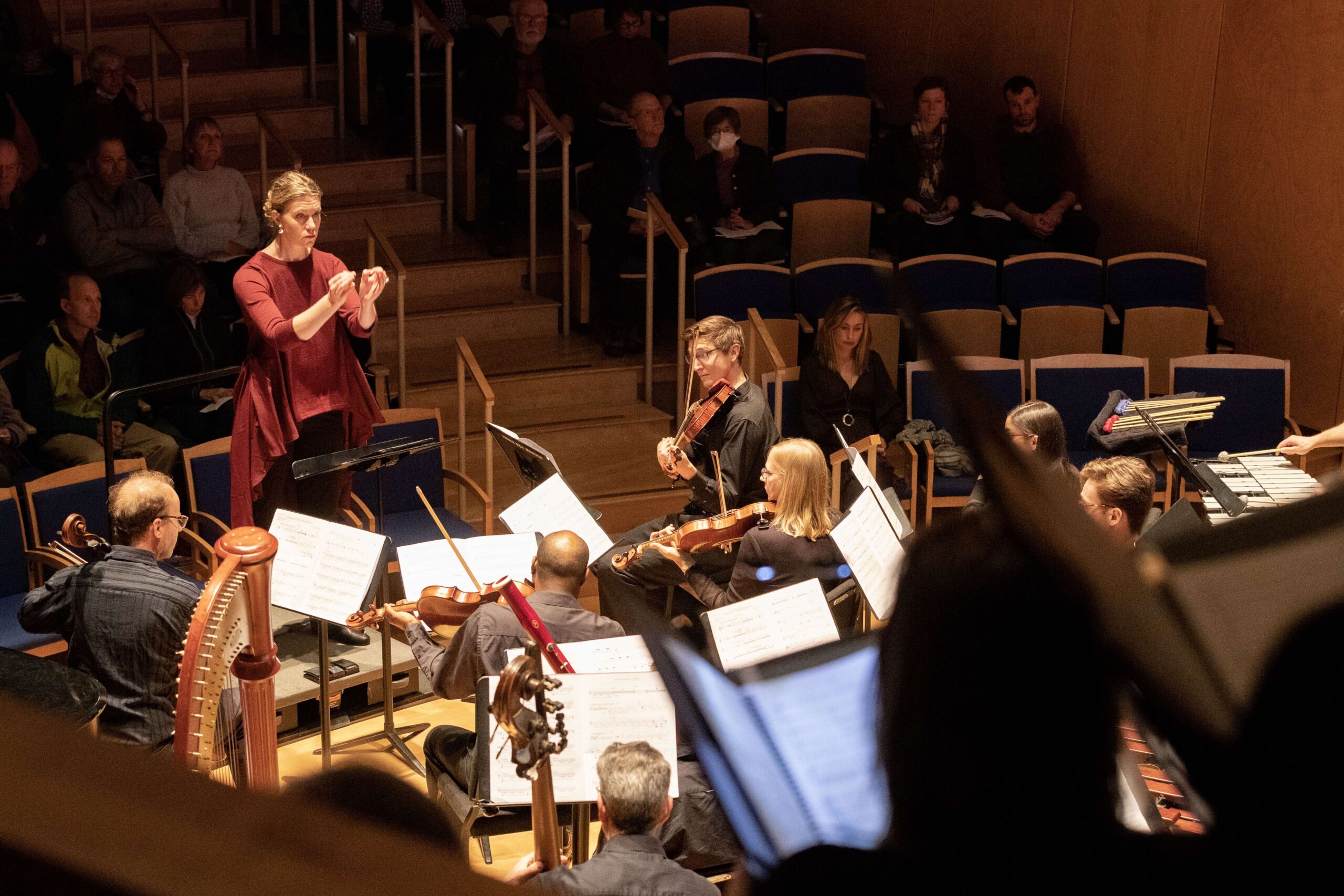Bowdoin Chorus and Oratorio Chorale bring composer Snider in residency for choirs’ final performance together
May 5, 2023
 Courtesy of Andrew Estey
Courtesy of Andrew EsteyEditor’s Note May 6, 2023 at 5:40 p.m.: An earlier version of this article referred to Oratorio Chorale as Portland-based. This article has been updated as the Chorale works throughout Maine and has a long history in Brunswick.
On Sunday afternoon, students, faculty and members of the Brunswick community filed into Studzinski Recital Hall for the final performance from the collaboration between the Bowdoin College Chorus and the Portland-based Oratorio Chorale, a partnership which will not return in the next academic year.
For what could be considered quite literally as its “swan song,” the choir performed “Mass for the Endangered,” a piece composed in 2020 by ascendant classical composer Sarah Kirkland Snider, who spent the week leading up to the performance in residency at the College.
Snider said the inspiration for the piece came from a commission by Trinity Wall Street Church in New York City, which tasked several composers with reimagining the traditional Catholic Mass. Snider, in conjunction with her friend and fellow artist, poet Nathaniel Bellows, wrote the score as both a celebration and elegy for the natural world, with particular focus on the plight of endangered animals.
Snider said that the music puts a spin on many of the Biblical references made in the original Latin, blending her contemporary concern for the environment with the ancient text.
“We tried to figure out how we use the Latin mass as a prism to take on secular themes, including taking this Latin text and substituting Mother Nature for God and Jesus,” Snider said.
But it’s not just the lyricism that blended the old and the new: accompanying each of the six movements was a nature-inspired moving image, projected over the choir throughout the performance. These visuals were part of Snider’s larger goal of bringing classical music into the 21st century.
This vision is shared by Teaching Associate in Music Emily Isaacson, who directs the Chorus. Isaacson also founded Portland-based arts group Classical Uprising, which includes the Oratorio Chorale.
“Sarah and I both feel incredibly passionate about this music and about the history of this music, but we’ve got to make it relevant and a part of the larger scene,” Isaacson said.
Isaacson also made special note of Snider’s unique identity within the classical music world.
“She’s an amazing, amazing composer, period. She’s a female composer, period. It’s really awesome to have those two things,” Isaacson said.
Snider’s residency meant that choir members were able to spend the week with her, bringing the composer to performances, dress rehearsals and dinners.
Apart from bonding with students and community musicians alike, Isaacson said that Snider’s residency provided valuable insight into the music and kept her faithful to the original score.
“I have studied this score for like nine months, and yet [Snider] knows it way better than I, and so one of the things that she offers is this insight into things that we haven’t noticed yet,” Isaacson said. “If she weren’t here, there were little moments I would have cheated on which would have made it a lot easier for the ensemble, but because she was here most of the time, we just had to do it.”
Despite the ensemble not being a professional choir, Snider said she walked away impressed by its willingness to work through a difficult piece.
“They worked so hard and were so devoted, and every day it was exponentially better and then [Saturday and Sunday] I was completely choked up in these performances because I saw what they did,” Sniday said. “They all brought their A game and they just blew me away.”
Not only did Snider walk away impressed by the work of the choir, but she says her week in residency reminded her of why she chose her career as a composer.
“The week was really such a moving experience. It reminded me why I write music in the first place: to make these connections,” Snider said.
The goodwill went both ways, according to choir member Dana Hillebrecht ’26.
“[Snider] is an amazing person. It feels kind of surreal that she’s been with us,” Hillebrecht said. “She’s been driving in our van, we’ve been having dinner with her and then I have to remind myself who she is.”
The connection between students and composer is part of a larger goal Isaacson brings to the organization: cross-generational bonds. She says it’s these connections that she’ll miss the most when the College ends the program next year.
“I think one of the detriments of college is that you are in this bubble of 18 to 22 year olds, and it’s so easy to lose perspective on so many different components of life,” Isaacson said. “I think the opportunity to engage with people of other age groups is really good for mental health … and it’s something I’m really sorry Bowdoin is getting rid of.”

Comments
Before submitting a comment, please review our comment policy. Some key points from the policy: